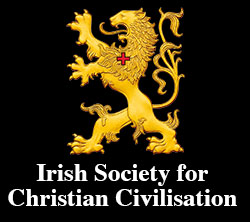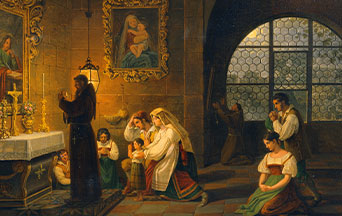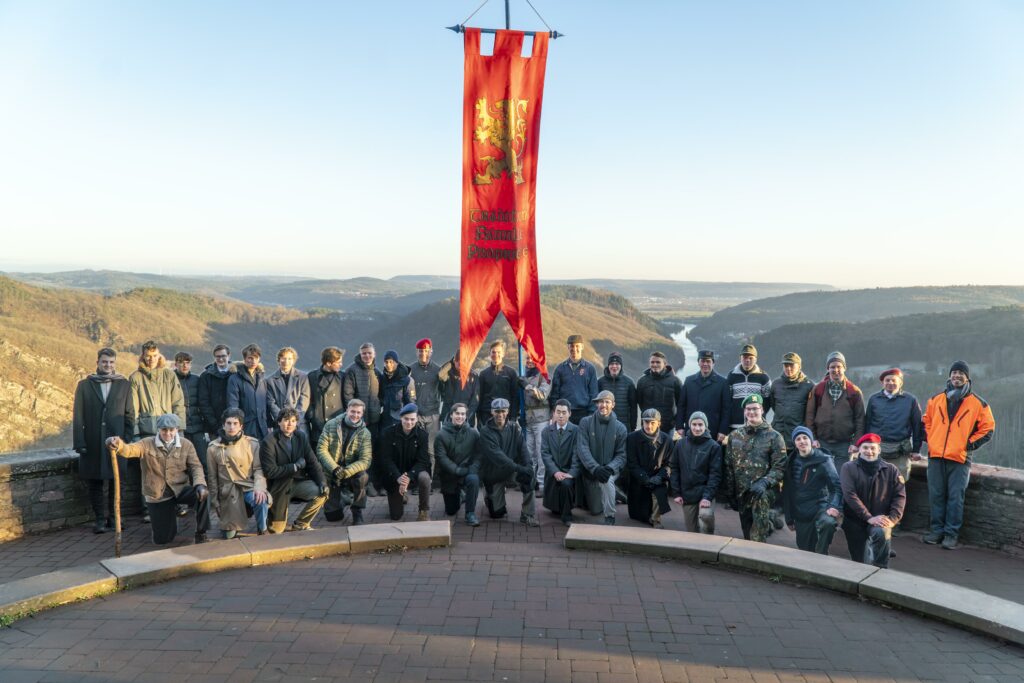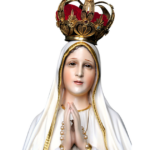
A Catholic soul is filled with sadness when it must criticise a member of the once glorious Society of Jesus founded by Saint Ignatius of Loyola, a religious order that did so much good for the Church. Alas, corruptio optimi pessima—the corruption of the best is the worst of all.
This reflection comes to mind looking at the book by Fr. James Martin, S.J., Building a Bridge: How the Catholic Church and the LGBT Community Can Enter into a Relationship of Respect, Compassion, and Sensitivity.1 Father Martin is an American Jesuit priest, writer, and editor-at-large of the Jesuit magazine America. In April 2017, Pope Francis appointed him as a consultant to the Vatican’s Secretariat for Communications.
A Serious Omission: the Distinction Between Homosexual Tendency and Act
Throughout the book, Father Martin carefully avoids distinguishing between persons with same-sex attraction who resist these deviant tendencies with the help of grace and those who indulge in unnatural proclivities, turning them into acts.
He refers to the “LGBT community” and “LGBT people”2 to designate homosexuals and “transgenders,” lumping together those who suffer from same-sex attraction but resist and those who succumb to unnatural vice. However, the “LGBT” acronym does not apply to those who resist temptation but only to activists who seek to impose on society the acceptance of their unnatural practices and way of life as normal and even excellent.
Dishonest Sleight-of-Hand
Father Martin uses a dishonest artifice to deceive the unwary. He takes the Catechism’s assertion that people with “deep-seated homosexual tendencies” “must be accepted with respect, compassion, and sensitivity,” and that “unjust discrimination in their regard should be avoided,”3 and applies them to homosexual activists and “transgenders.” He devotes the entire first part of his book to commenting on how people should show “respect, compassion, and sensitivity” to members of the LGBT movement!
It is not with tricks that we show love for Truth and charity to neighbor, but by labouring honestly to free sinners from the enslavement of vice and restoring them to virtue and faithfulness to God and His Law.
The Condemned New Ways Ministry Is at the Book’s Origin
Fr. James Martin tells us how New Ways Ministry is at the origin of his book:
“[W]hen New Ways Ministry, a group that ministers to and advocates for LGBT Catholics, asked just a few weeks after the Orlando tragedy if I would accept their “Bridge Building Award” and give a talk at the time of the award ceremony, I agreed. The name of the award, as it turned out, inspired me to sketch out an idea for a “two-way bridge” that might help bring together both the institutional church and the LGBT community.
The bulk of this book is that talk, which has been expanded into a longer essay.”4
However, Sr. Jeannine Gramick and Fr. Robert Nugent, founders of New Ways Ministry, and authors of a 1992 book significantly titled Building Bridges: Gay and Lesbian Reality and the Catholic Church, were condemned by the Congregation for the Doctrine of the Faith in 1999.5
Furthermore, New Ways Ministry itself was condemned in a 2010 statement by Francis Cardinal George, President of the United States Conference of Catholic Bishops,6 and again in a 2011 statement signed by Donald Cardinal Wuerl and Bishop Salvatore Cordileone:
“In view of the recent booklet Marriage Equality: A Positive Catholic Approach, by Francis DeBernardo (published by New Ways Ministry), we, as the respective chairmen of the USCCB Committee on Doctrine and the Ad Hoc Committee for the Defense of Marriage, wish to reaffirm Francis Cardinal George’s statement of February 12, 2010 and assure Catholics that in no manner is the position proposed by New Ways Ministry in conformity with Catholic teaching and in no manner is this organisation authorised to speak on behalf of the Catholic Church or to identify itself as a Catholic organisation.”7
“Canonise” a Rebel, Pro-Homosexual Nun?
New Ways Ministry co-founder Sr. Jeannine Gramick declared her support for same-sex “marriage” publicly.8 Notwithstanding this and her Vatican condemnation, Father Martin expressed his admiration for her and suggested, perhaps in jest, that she should be canonised.9
Taking a Principled not a Personal Stand
As practicing Catholics, we are filled with compassion and pray for those who struggle against violent temptation to sin, be it toward homosexual sin or otherwise.
We are conscious of the enormous difference between these individuals who struggle with their weaknesses and strive to overcome them and others who transform their sin into a reason for pride, and try to impose their lifestyle on society as a whole, in flagrant opposition to traditional Christian morality and natural law. However, we pray for them too.
According to the expression attributed to Saint Augustine, we “hate the sin but love the sinner.” And to love the sinner, as the same Doctor of the Church explains, is to wish for him the best we can possibly desire for ourselves, namely, “that he may love God with a perfect affection.” (St. Augustine, Of the Morals of the Catholic Church, No. 49, www.newadvent.org/fathers/1401.htm)
A Defense of Homosexuality and “Transgenderism”
Father Martin’s prayer “composed for all who feel excluded, rejected, marginalized, shamed or persecuted” (read: LGBT, etc.) at the end of the book, summarizes the thesis of the book:
Loving God, you made me who I am…. And, God, help me remember that Jesus loves me. For he too was seen as an outcast. He too was misunderstood. He too was beaten and spat upon. Jesus understands me and loves me with a special love, because of the way you made me.10
Father Martin blasphemously implies that it was God himself who made these individuals homosexual and “transgender.” Borrowing from Liberation Theology’s view of the “marginalized” and poor as “oppressed,”11 he suggests that they are persecuted because of a God-given unnatural deviation, and this condition supplies them with a redemptive character. In other words, just as Christ was despised, rejected, and immolated on the Cross to save men, so also those who allow themselves to be carried away by the vice of homosexuality or who revolt against the sex of their birth (which was indeed God-given), are “misunderstood” “outcast” “beaten and spat upon.” They are victims. Like other “Christs,” they suffer for the rest of men.
Normalising Sexual Deviance
Given this implicit and shocking premise, everything the Church has taught about morality and sins against nature must be changed, beginning with this statement in the Catechism of the Catholic Church: “This inclination [to same-sex attraction]…is objectively disordered.”12
Now then, on page 46, this is precisely what Father Martin and others propose: “Some bishops have already called for the church to set aside the phrase ‘objectively disordered’ when it comes to describing the homosexual inclination.”13
And, he continues, “Our sexuality, in a sense, touches everything we do, including the way that we love…. So to call a person’s sexuality ‘objectively disordered’ is to tell that person that all of his or her love, even the most chaste, is disordered. That seems unnecessarily cruel.”14
In Freud’s Shadow
Here one sees Sigmund Freud’s shadow, with his theory that man is dominated and led by his sexual instinct: “Our sexuality, in a sense, touches everything we do…”
However, what defines the human person is not sexuality but rationality and behavior according to the divine laws expressed in human nature. Instincts, including that of procreation, are only part of human nature, not its directive element. Unlike animals, which act blindly, impelled by instincts, thanks to his intellect and free will, man can dominate and guide his impulses, especially when he asks for the help of grace. God never refuses to listen to a “contrite and humbled heart” (Ps. 50:19).
Human love, though it has a procreative sexual dimension within marriage, is not rooted in that dimension but in a spiritual and affective affinity.
Homosexuality: a “Gift” for the Church?
Once one accepts the premise that God made homosexuals with their unnatural deviation and that this gives them a “redeeming” aspect, the logical conclusion is that homosexuals and “transgenders” should be seen as privileged members of the Church.
Father Martin explains: “LGBT Catholics bring unique gifts to the church—both as individuals and as a community. These gifts build up the church in special ways, as St. Paul wrote when he compared the People of God to a human body (1 Corinthians 12:12-27).”15
In the referenced passage, the Apostle is referring to the Mystical Body of Christ—the Church. It is a holy Body, to which those who have lost sanctifying grace through mortal sin do not belong. Although they continue being members of the Church, they are dead and dry branches that if they do not convert will be cut off and cast into the everlasting fire of Hell (cf. John 15:6).
Father Martin claims that homosexuals and so-called transgenders “build up the church” imply that he considers them to be in the state of grace and therefore living members of the Body of Christ. Moreover, he says that “these gifts” (homosexuality, lesbianism, “transgenderism”) “build up the church in special ways.” In other words, theirs is a privileged contribution, and the Church would somehow be less developed without their sins against nature!
Two Cardinals, a Bishop, and… Sister Gramick
Unfortunately, Father Martin’s deplorable efforts to change Church perennial moral teaching on the grave sinfulness of homosexual acts find wide acceptance among fellow Jesuits and in sectors of the Catholic hierarchy and clergy. In fact, two American bishops who were recently made cardinals by Pope Francis—Kevin Cardinal Farrell, Prefect of the Vatican Dicastery for Laity, Family and Life, and Joseph Cardinal Tobin, Archbishop of Newark—along with Bishop Robert W. McElroy of San Diego and Sister Jeannine Gramick wrote rave reviews for Father Martin’s book.
Who Is the True Friend?
Father Martin presents himself as a great friend of homosexuals and “transgenders.” In reality, he is their enemy, for instead of seeking to remove them from the sin in which they objectively find themselves—as would be required by his priestly duty and by Christian charity—he works to convince them that they are in the friendship of God.
True friendship and charity toward those who are in sin or in danger of falling into sin consist in helping them to give up vice or overcome temptation.
While everything must be done to help sinners, this cannot include helping them sin or remain in vice. Given human frailty, a sinner deserves pity and compassion. However, vice and sin themsleves must be excluded from this compassion, since sin can never be the proper object of compassion. When a misguided pity leads to supplying the sinner with the means of remaining attached to his vice, this assistance, be it material or moral, actually helps to keep the sinner chained to his evil ways.
Such action helps vice, not the person. Despite good intentions, the action is harmful. True compassion leads a sinner away from vice and back to virtue.
In short, according to the famous expression attributed to Saint Augustine, we “hate the sin but love the sinner.”16 And to love the sinner, as the same Doctor of the Church explains, is wishing for him the best we can possibly desire for ourselves, namely, “that he may love God with a perfect affection.”17
In his book, Father Martin distorts the clear principles of Christian morality and natural law concerning the sins that led to God’s destruction of Sodom and Gomorrah. He confuses Catholics and reinforces in unnatural vice those who unfortunately have fallen into it. His book is, therefore, unacceptable.
Footnotes
- James Martin, S.J., Building a Bridge: How the Catholic Church and the LGBT Community Can Enter into a Relationship of Respect, Compassion, and Sensitivity (San Francisco: Harper One, 2017), 145. Father Martin’s book received an Imprimatur from the Very Rev. John Cecero, S.J., Provincial Superior, USA Northeast Province of the Society of Jesus. In quotes from this book, all emphases are mine.
- Cf. Ibid., 19, 45.
- Catechism of the Catholic Church, No. 2358.
- Martin, Building a Bridge, 5.
- Congregation for the Doctrine of the Faith – Notification Regarding Sister Jeannine Gramick, SSND, and Father Robert Nugent, SDS, accessed Jan. 22, 2018, http://www.vatican.va/roman_curia/congregations/cfaith/documents/rc_con_cfaith_doc_19990531_gramick-nugent-notification_en.html.
- “USCCB President Clarifies Status of New Ways Ministry,” Feb. 12, 2010, accessed Jan. 22, 2018, http://www.usccb.org/news/2010/10-028.cfm.
- Catholic World News, “US bishops reaffirm: New Ways Ministry not a Catholic organization,” CatholicCulture.org, Mar. 17, 2011, accessed Jan. 22, 2018, http://www.catholicculture.org/news/headlines/index.cfm?storyid=9636.
- Cf. Jeannine Gramick and Francis DeBernardo, “A Catholic case for same-sex marriage,” The Washington Post, Feb. 14, 2012, accessed Jan. 22, 2018, https://www.washingtonpost.com/local/a-catholic-case-for-same-sex-marriage/2012/02/13/gIQAl4cwDR_story.html?utm_term=.345c1b1f424d; “Catholics Participate in Prayer Service and Demonstration at Supreme Court,” Mar. 27, 2013, New Ways Ministry, accessed Jan. 22, 2018, https://www.newwaysministry.org/2013/03/27/catholics-participate-in-prayer-service-and-demonstration-at-supreme-court/.
- Cf. Ashley McKinless, “Father James Martin: L.G.B.T. Catholics have been treated like dirt. We can do better,” America, Jun. 16, 2017, accessed Jan. 22, 2018, https://www.americamagazine.org/faith/2017/06/16/father-james-martin-lgbt-catholics-have-been-treated-dirt-we-can-do-better. (“I’m going to canonize Sr. Jeannine Gramick.” See 32:14 of the audio recording.)
- Op. cit. p. 145.
- Cf. Luiz Sérgio Solimeo, “‘Rehabilitation’ of Liberation Theology?” At http://www.tfp.org/rehabilitation-of-liberation-theology/; Idem, Liberation Theology, a KGB Invention? That Is Way Too Simple…, http://www.tfp.org/liberation-theology-a-kgb-invention-that-is-way-too-simple/, accessed Jan. 23, 2018.
- Catechism of the Catholic Church, No. 2358, accessed Jan. 22, 2018, http://www.vatican.va/archive/ccc_css/archive/catechism/p3s2c2a6.htm, accessed Jan. 23, 2018.
- Martin, Building a Bridge, 46. This wish seems to have been already fulfilled, at least in the Catechism’s English edition published by An Image Book – Doubleday, April 1995. It omits the phrase. Cf. page 625, No. 2358.
- Ibid., 46-47.
- Ibid., 24.
- Cf. Saint Augustine, Exposition on the Book of Psalms, Ps. 119, accessed Jan. 22, 2018, www.ccel.org/schaff/npnf108.ii.CXIX.xv.html.
- Saint Augustine, Of the Morals of the Catholic Church, No. 49, accessed Jan. 22, 2018, www.newadvent.org/fathers/1401.htm.
This year, it is more crucial than ever that we turn to prayer and intercession to increase devotion to Our Lady across our country. That’s why you’re invited to join us in the Three Hail Marys Pledge, a powerful devotion that can bring personal spiritual benefits and national transformation. By reciting three Hail Marys daily, you honour the Immaculate Heart of Mary and seek her intercession for the conversion of sinners, the salvation of souls and the restoration of Ireland’s Catholic Faith. This ancient devotion, revealed to Saint Mechtilde, promises spiritual benefits including protection from mortal sin and the assurance of a good death. Your daily prayers will contribute to an increase in devotion to Our Lady, the conversion of sinners and the moral renewal of our country. Let us commit to this powerful devotion and seek the guidance and protection of Our Lady.







